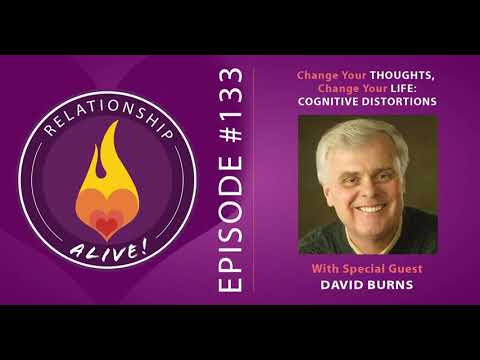The way that you think creates the way you feel. If you have great thoughts then no problem, but if your thoughts are a little distorted, then…look out! Wouldn’t it be great if there were an easy way to look at your thoughts…and change them? As it turns out – there is! In today’s conversation we are going to show you how to identify the kinds of thoughts that lead to depression, anxiety, shame, anger, and self-doubt – and talk about the process that you can go through to eliminate those thoughts for good. Our guest is Dr. David Burns, author of the acclaimed bestseller Feeling Good and one of the leading popularizers of Cognitive Behavioral Therapy (CBT). He is also the creator of TEAM therapy, which takes CBT to the next level. Today, David Burns and I are tackling the topic of “cognitive distortions” – the messed-up thinking that can get you stuck in negative emotions. By the end of today’s episode you’ll not only be able to spot the times when your thinking gets distorted, but you’ll know what to do about it so that you can “feel good”.
If you want to listen to our first episode together, where David Burns and I spoke about how to apply his work in relationships (based on his book Feeling Good Together), here is a link to Episode 98: How to Stop Being a Victim – Feeling Good Together – with David Burns
And, as always, I’m looking forward to your thoughts on this episode and what revelations and questions it creates for you.
Join us in the Relationship Alive Community on Facebook to chat about it!
Resources:
Check out Dr. David Burns’s website
Read David’s classic books, Feeling Good or When Panic Attacks
FREE Relationship Communication Secrets Guide
www.neilsattin.com/feelinggood2 Visit to download the transcript, or text “PASSION” to 33444 and follow the instructions to download the transcript to this episode with David Burns
Amazing intro/outro music graciously provided courtesy of: The Railsplitters – Check them Out
Transcript
Neil Sattin: Hello and welcome to another episode of Relationship Alive. This is your host Neil Sattin. On today’s show, we’re going to cover ways that your thinking can be distorted. And, by being distorted can impact the way you feel, the way you behave, the way you interact with other people, and basically get in the way of you being an effectively functioning human being.
Neil Sattin: I’m talking about cognitive distortions and they’ve been mentioned a little bit on the show before, but I wanted to take this opportunity to dive deeply into the ways that our thinking can just be messed up. From that messed upness – and no that is not a technical term – comes all sorts of problems.
Neil Sattin: From today’s show, what my hope is for you is that you understand these things well enough so that you can spot them happening in your own thinking and perhaps in the thinking and reasoning of those around you. We’re going to talk about effective strategies for changing the pattern.
Neil Sattin: In order to do that, we have with us today a fortunate return visit from Dr. David Burns who was on the show back in episode 98 where we talked about how to stop being a victim in your relationship. This was an episode that was all based on David’s work in a book called Feeling Good Together.
Neil Sattin: If you’re interested in hearing that, you can go to neilsattin.com/feelinggood. What I wanted to talk about today relates to some of the pioneering work that David did in popularizing cognitive behavioral therapy primarily through his book Feeling Good which has sold millions of copies all over the world and has been prescribed and shown to actually help people with depression simply by reading the book and going through the exercises.
Neil Sattin: I’m very excited to have David with us today, we’re going to talk about cognitive distortions, we’re probably going to touch on TEAM therapy which is his latest evolution that’s attacking some of the problems with cognitive behavioral therapy. And hear about some of the amazing results that that’s getting and get some insight into how that even works.
Neil Sattin: Without any further ado, let us dive right in. David Burns, thank you so much for joining us again here on Relationship Alive.
David Burns: Thanks Neil, I’m absolutely delighted to be on your podcast for two reasons. First, I think you’re a tremendous host. You know your stuff both technically and you know my background, you do your homework, that’s very flattering to me being interviewed, but also you seem to exude a lot of warmth and integrity, just a pleasure to hang out with you a little bit today and your many, many listeners.
Neil Sattin: Thank you. Thank you so much. I appreciate your saying that. This stuff is important to me. I’m hoping that this podcast makes a big difference in the world and the way that we do that is through being able to feature amazing work…
Neil Sattin
Source




Nice to hear David Burns talk about how overrated exercise is for dealing with depression. I know this is anecdotal, but think of all the professional athletes on top of their game who suffer from depression.
Thank you for all your ongoing wisdom, incentive and thus expertise to benefit my path to turning into more consciously alert and so spiritually connected.
I so enjoyed this episode with you and David it is very helpful.
It's like know when I am beating myself up with negative thoughts which can be so crippling.
This will help in a solution to this messed up thinking!
You're an amazing interviewer, I love how you don't interrupt Dr Burns, and let him talk, and you have a lovely way of talking too, this is so rare in interviews. I look forward to hearing Dr Burns talk about empathy and more good stuff! Dr Burns is the best. I can listen to him for hours, it's never enough! Thank you for this wonderful interview!
I have lot of distorted thoughts.
How to replace them.
Addicts suffer from this and it’s a struggle to overcome. But know that I’m working on myself I see and able to spot it. But when conversation starts to go fast it’s hard to slow down the negative thinking. Hope this makes sense.
So I stop a breath to slow down but having a hard time changing thoughts.